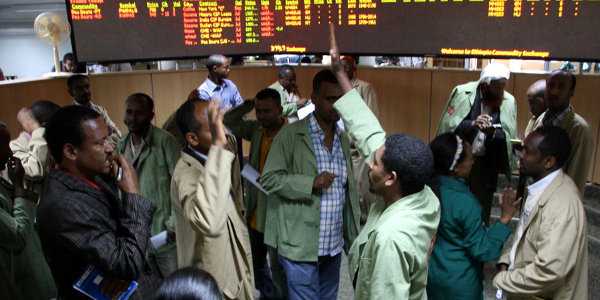ADDIS ABABA, Ethiopia – A document drafted by a group of 20 people representing the public and private sector, and refined by an institution called Economy Success Planning Sector, formed under the Office of the Prime Minister and led by Arkebe Oqubay (PhD), which attempted to figure out how to improve the coffee trade has recommended the Ethiopian Commodity Exchange (ECX) terminate some process it uses for trading coffee.
It also raised concerns about how effective EXC has been in trading coffee.
ECX begn operating nine years ago in an attempt to modernize the trading system and coffee was its first commodity.
However eventually, exporters and international buyers including the Specialty Coffee Association of America began expressing their disappointment to the former Prime Minster because they were unable to obtain premium products. To address this, specialty trading was introduced at ECX.
Coffee makes up 26 percent of the nation’s hard currency earnings. That figure declined dramatically, according to a document Capital obtained.
Coffee has not been as effective as it could be because lack of accountability has decreased customer satisfaction and hindered export revenue. ECX, the Ethiopian Agricultural Commodities Warehousing Service Enterprises (EACWSE), which spun-off from ECX about 31 months ago, and the Ethiopian Commodity Exchange Authority, are being partially blamed for some of this lack of accountability.
In addition the warehousing service for coffee has negatively impacted the sector, according to the report.
It goes on to argue that the operation at the warehouse makes traceability of coffee more difficult, requires additional time and cost for stuffing and un-stuffing the product, and leads to exporters not being paid at ECX.
As a solution the committee recommended dissolving the service and management of coffee under ECX and selling 90 percent of the product three days after it is loaded onto trucks.
Another policy which slows things down is a mandate that coffee pass through intermediary members of ECX, which is seen as inefficient. It recommended linking capable suppliers with exporters. According to experts, this action indicates that the government has lost trust in intermediary members that it feels have neglecting the trading system.
The document identified 11 main problems and recommended solutions. One of the major changes it says must happen is more traceability and quality control to improve the quality and increase the price. Traceability, sustainability and quality are the focus of an upcoming law targeted to transform the coffee sector.
“The country lost out on the specialty coffee market and so there needs to be new management,” the report reads.
The document recommended a method called Identity Preserved Trading that will identify the owner of the coffee and other information. This is being called a ‘new coffee trading model’ and improves traceability.
It said that some intermediary members and buyers abused the market using their vertical integration outside the trading floor.
“The trading floor is open to illegal pre marketing activity,” the document claimed. It said that some intermediary members, exporters and members are illegally sharing information which disturbs the trading, quality and price of the system. The new solution will be removing the obligation to buy the product via the intermediary members to stop pre-speculation of the market.
It said that besides implementing the new coffee trading model creating a linkage between exporters and suppliers and establishing a market relationship between the farmers with nearby coffee farm investors will decrease market speculation and illegal activity.
The coffee grading rate introduced by ECX will be also annulled by the new system. Before ECX there was another grading rate, which will be renewed under the new recommendations. Currently there are nine different qualities of coffee with very wide intervals.
The group that developed the document said ECX’s wide grading interval created an opportunity for suppliers to come up with a low quality product. The new grading system will be narrowed to five.
Coffee has historically been Ethiopia’s major export item in modern times and trading it has frequently been an issue. ECX has been recognized internationally for its success and was expected to make coffee trading more modern, trustworthy and farmer friendly.
However, traditional and long time coffee exporters have complained that the new trading system made Ethiopia’s specialty coffee untraceable. They argued that the trading system derided the high premium coffee into a commodity coffee.
Most of the exporters claimed that they lost long established relationships with their international buyers. “Since the formation of ECX we cannot get the coffee at a sustainable quality and in a traceable manner so we lost our buyers’ trust,” an exporter who is in the exporting business for more than four decades said.
There have been cross-subsidies for exports since it is a big source of hard currency, many coffee exporters have taken advantage of this and attempted to get preferential advantage that the government gives to exporters by giving them hard currency to import other products.
The price of coffee rose partially because some exporters intentionally kept the price high through nefarious means. For example when some of the new exporters get a license, they buy coffee at a high price on the international market and smuggle it to the local market, which gets them a lot of money. When the price of local coffee becomes higher than international prices many long time exporters are forced out of the business.
Several meetings have been held in the past few months since the government found out about the problem.
Muluken Yewondwossen


















